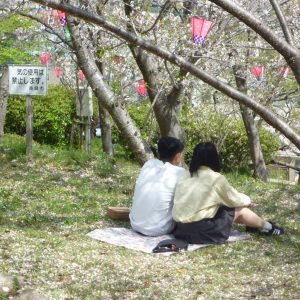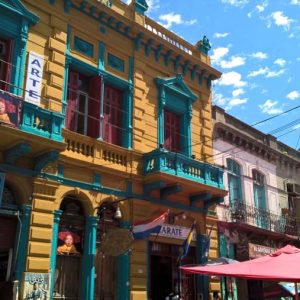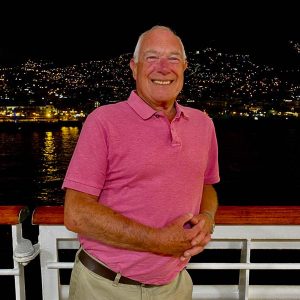Having landed and twenty minutes later I had reached my first hotel Wallawwa. It’s the original home of a Sinhalese family, 250 years old and now nine years into its renovated self. 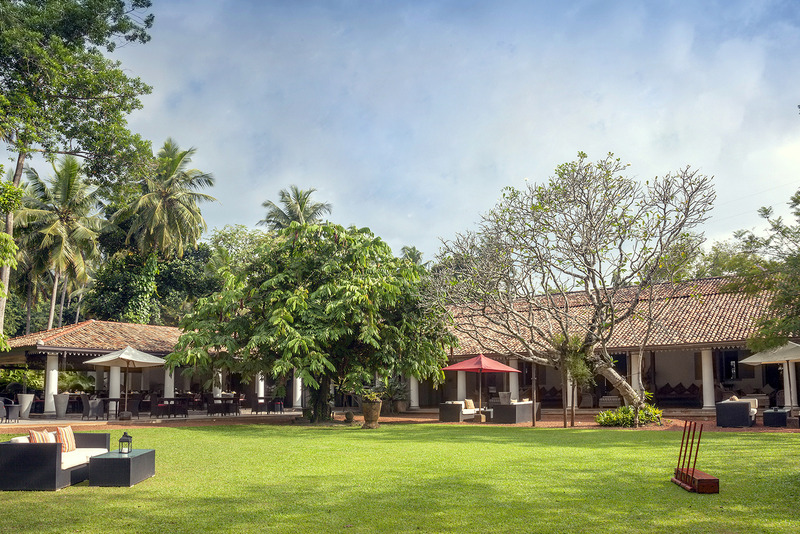 It’s a lovely legacy of colonialism. As I continued across the inland I got to recognise the pattern of jungle encroaching on villages that then spilt out onto streets. The neon shop signs of the towns were already familiar to me from other Asian visits as were the locals as they went about their lives sometimes a whole family to a bicycle. I felt a real delight in witnessing the source of my food as manual workers, up to their knees in mud in the paddy fields, left behind them immaculate rows of rice. And to taste their rice that evening made me appreciate my food all the more.
It’s a lovely legacy of colonialism. As I continued across the inland I got to recognise the pattern of jungle encroaching on villages that then spilt out onto streets. The neon shop signs of the towns were already familiar to me from other Asian visits as were the locals as they went about their lives sometimes a whole family to a bicycle. I felt a real delight in witnessing the source of my food as manual workers, up to their knees in mud in the paddy fields, left behind them immaculate rows of rice. And to taste their rice that evening made me appreciate my food all the more.
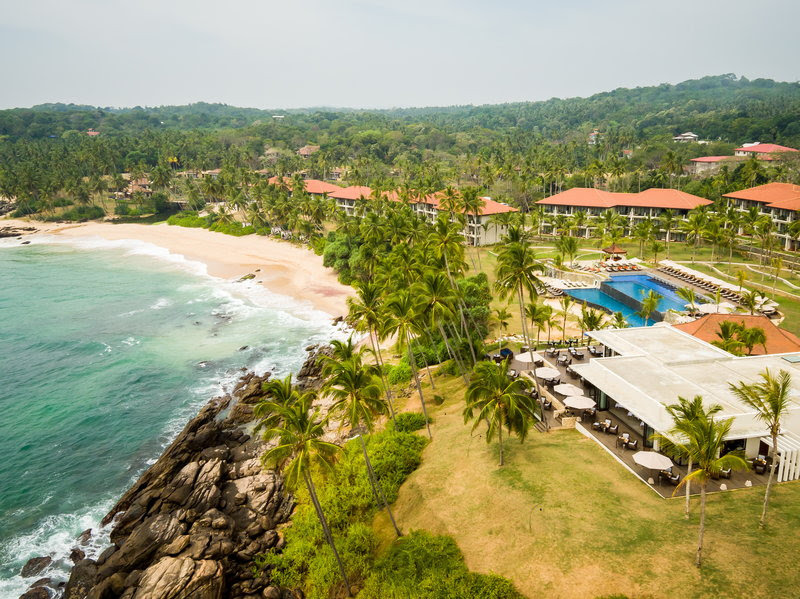 And so south I went, onto Tangalle, the home of the new Anantara Resort equipped with three great restaurants. ‘Journeys’ has a wide mix via a fully-stocked buffet, ‘Verele’ sticks to the unique flavours of Sri Lankan cooking and there’s Italian food at Il Mare on a cliff top overlooking the ocean. The decor is consistent with the hotel’s wheel motif echoed throughout.
And so south I went, onto Tangalle, the home of the new Anantara Resort equipped with three great restaurants. ‘Journeys’ has a wide mix via a fully-stocked buffet, ‘Verele’ sticks to the unique flavours of Sri Lankan cooking and there’s Italian food at Il Mare on a cliff top overlooking the ocean. The decor is consistent with the hotel’s wheel motif echoed throughout.
I walked right next door the next morning to the stunning hotel Amanwella. Each room is identical in layout and design and comes with a plunge pool. 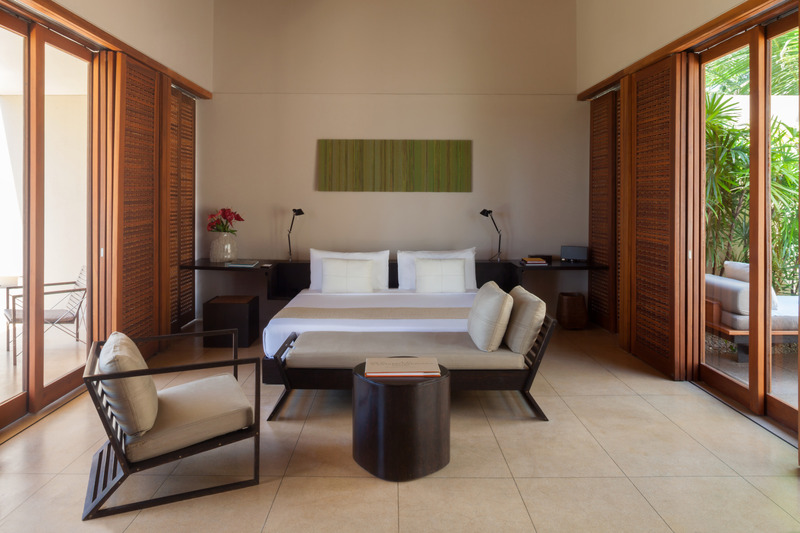 The colours are harmonious and there is a zen ambiance. Inside the terrazzo flooring is in muted, sandy tones to reflect the nearby beach. The large timber sliding panels separate the interior from the exterior. Mercifully there are no televisions in the rooms.
The colours are harmonious and there is a zen ambiance. Inside the terrazzo flooring is in muted, sandy tones to reflect the nearby beach. The large timber sliding panels separate the interior from the exterior. Mercifully there are no televisions in the rooms.
The writer Leonard Woolf described Tangalle with great precision: “The evening air is warm and gentle. An enormous sky meets an enormous sea. The stars blaze in the sky and blaze in the sea … there is no sound in this melodrama of a tropical night except a faint lapping of the sea, and now and then a shivery stir of palm leaves”. And it’s true that here at Amanwella there is a real paradise. The golden beach, curving for half a mile in a gentle arc, is flanked by two rocky headlands. The water is certainly crystal clear and the sand is fabulously fine and powdery.
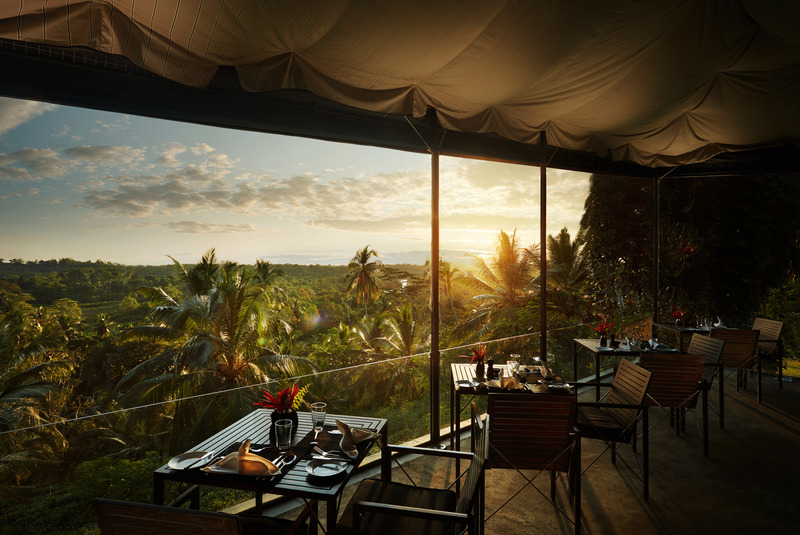 On I go and up inland to Lake Koggala and onto my next hotel, the Kahanda Kanda with all the trappings of colonial life so reassuringly familiar to Brits. From my breakfast table, I could just about make out Koggala Lake. I decided to take a boat trip and visit the Buddhist monastery established there for monks. They looked amazing as they wondered around in their vivid orange tunics waiting to be initiated into their calling.
On I go and up inland to Lake Koggala and onto my next hotel, the Kahanda Kanda with all the trappings of colonial life so reassuringly familiar to Brits. From my breakfast table, I could just about make out Koggala Lake. I decided to take a boat trip and visit the Buddhist monastery established there for monks. They looked amazing as they wondered around in their vivid orange tunics waiting to be initiated into their calling.
Then onto Maliga Kandy. It’s part of Hideaways Club Classic Collection portfolio with properties all around the world. It’s ideal for someone who doesn’t want to be restricted to one location or have the hazzle of maintenance. It’s a gem in the jungle, begun in 2010 and offering something for everyone with seven bedrooms including a separate cottage for teenagers. The staff, comprising of security, cooks, cleaners and gardeners are attentive and charming.
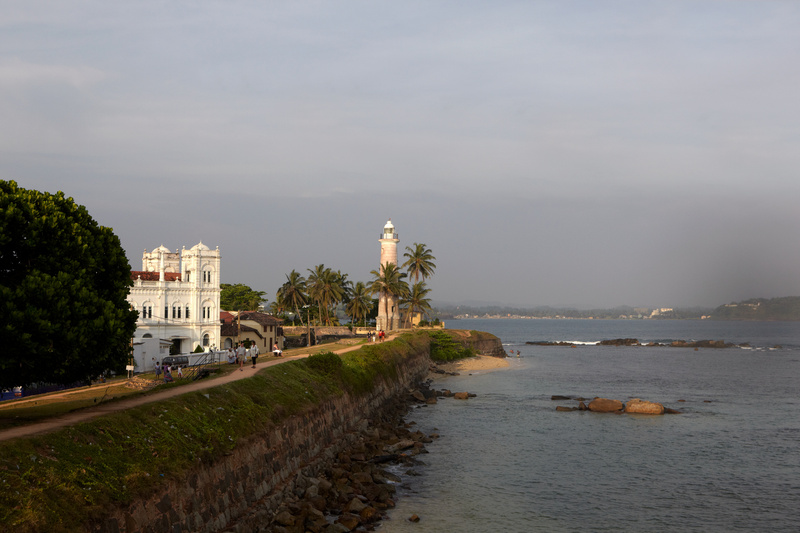 The lovely crescent beach at Unawatuna has beautiful yellow sand but is sadly swamped by tourism. I managed to regain a sense of peace at the nearby Japanese pagoda with its pure white paint offset on all four sides by gold statues. It has an impressive 360 degree view of the jungle, the bay and the Galle fort I was soon to visit. I got a great sense of innocence at the local railway station that is a wonderful throwback in time with old-fashioned timetables behind glass frames and I would love to have had time to be a passenger snaking through all that wonderful landscape.
The lovely crescent beach at Unawatuna has beautiful yellow sand but is sadly swamped by tourism. I managed to regain a sense of peace at the nearby Japanese pagoda with its pure white paint offset on all four sides by gold statues. It has an impressive 360 degree view of the jungle, the bay and the Galle fort I was soon to visit. I got a great sense of innocence at the local railway station that is a wonderful throwback in time with old-fashioned timetables behind glass frames and I would love to have had time to be a passenger snaking through all that wonderful landscape.
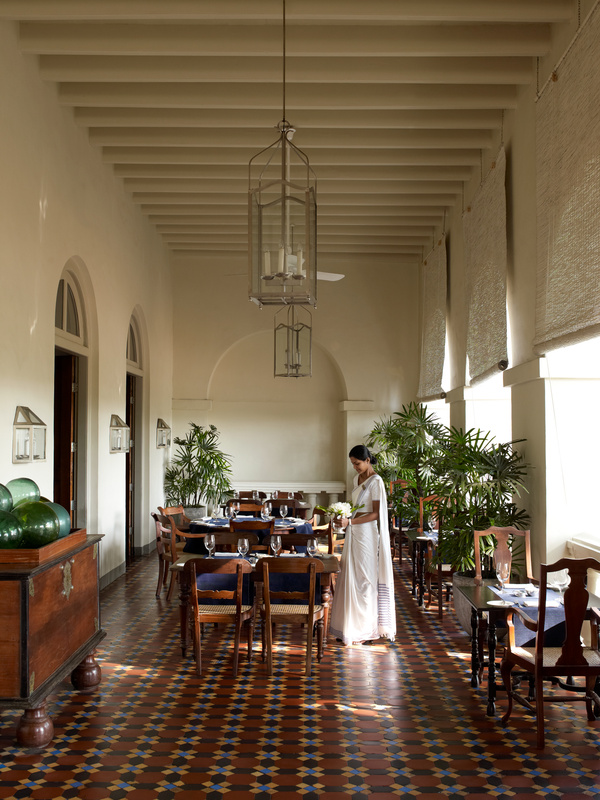 Then onto Amangalla. While clearly the supreme standard of an Aman hotel must have given the building quite some makeover. The ‘Zaal’ (hall) has memorable white walls with angled mirrors that reflect the light and the candles and it’s furnished with rattan chairs and sofas. The high ceiling has overhead fans and modern metallic chandeliers.
Then onto Amangalla. While clearly the supreme standard of an Aman hotel must have given the building quite some makeover. The ‘Zaal’ (hall) has memorable white walls with angled mirrors that reflect the light and the candles and it’s furnished with rattan chairs and sofas. The high ceiling has overhead fans and modern metallic chandeliers.
In 1850 there used to be a 45 minute pigeon post from Galle to Colombo, flying at some 85mph, established by The Observer newspaper. Even with the new motorway it was bound to take me a little longer to reach the capital. Transport has its own challenges even now with the right of way always open to question. So renting a car would not be my suggestion. Tuk-tuks are fun to take and breezy especially on the minor roads. While dishing out advice, I stress you just have to respect the midday intensity of the sun and likewise the savage currents of the Indian Ocean.
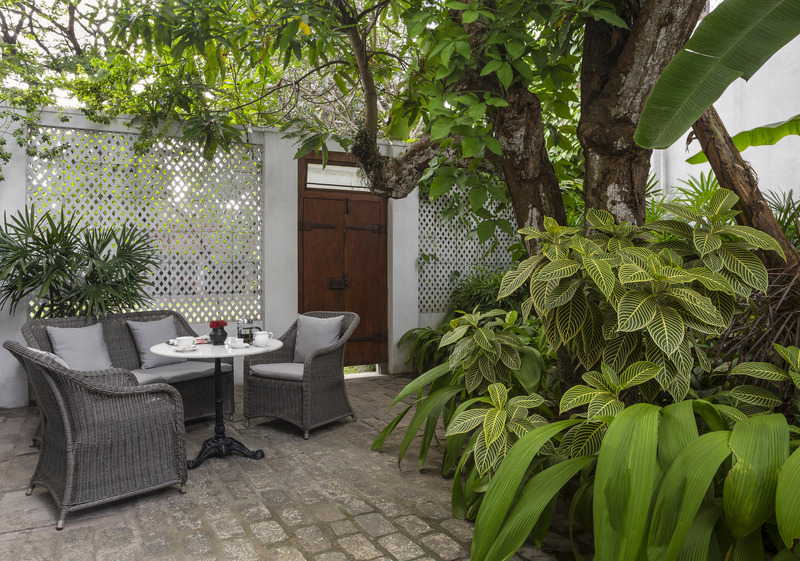 And onto to my final destination Maniumpathy. The eight suites with artefacts and vintage furnishings are named after the members of a fifth generation Tamil family from Jaffna (where Manipay was a thriving and wealthy locality). It worked perfectly for me as a base for Colombo before my final journey home.
And onto to my final destination Maniumpathy. The eight suites with artefacts and vintage furnishings are named after the members of a fifth generation Tamil family from Jaffna (where Manipay was a thriving and wealthy locality). It worked perfectly for me as a base for Colombo before my final journey home.
‘Ayubowan’ is the Sinhalese word for every form of greeting stretching from ‘good morning’, ‘good afternoon’, ‘good evening’, ‘good night’ to‘good-bye’. Ayubowan!
Adam Jacot de Boinod worked on the first series of the BBC panel game QI for Stephen Fry. He is a British author having written three books about unusual words with Penguin Press.
More information
Adam travelled with The Holiday Place that has a wide range of holidays to Sri Lanka from just £699, including flights, accommodation and transfers. Call 020 7644 1770 and let the experts tailor-make your holiday or visit holidayplace.co.uk to book.

